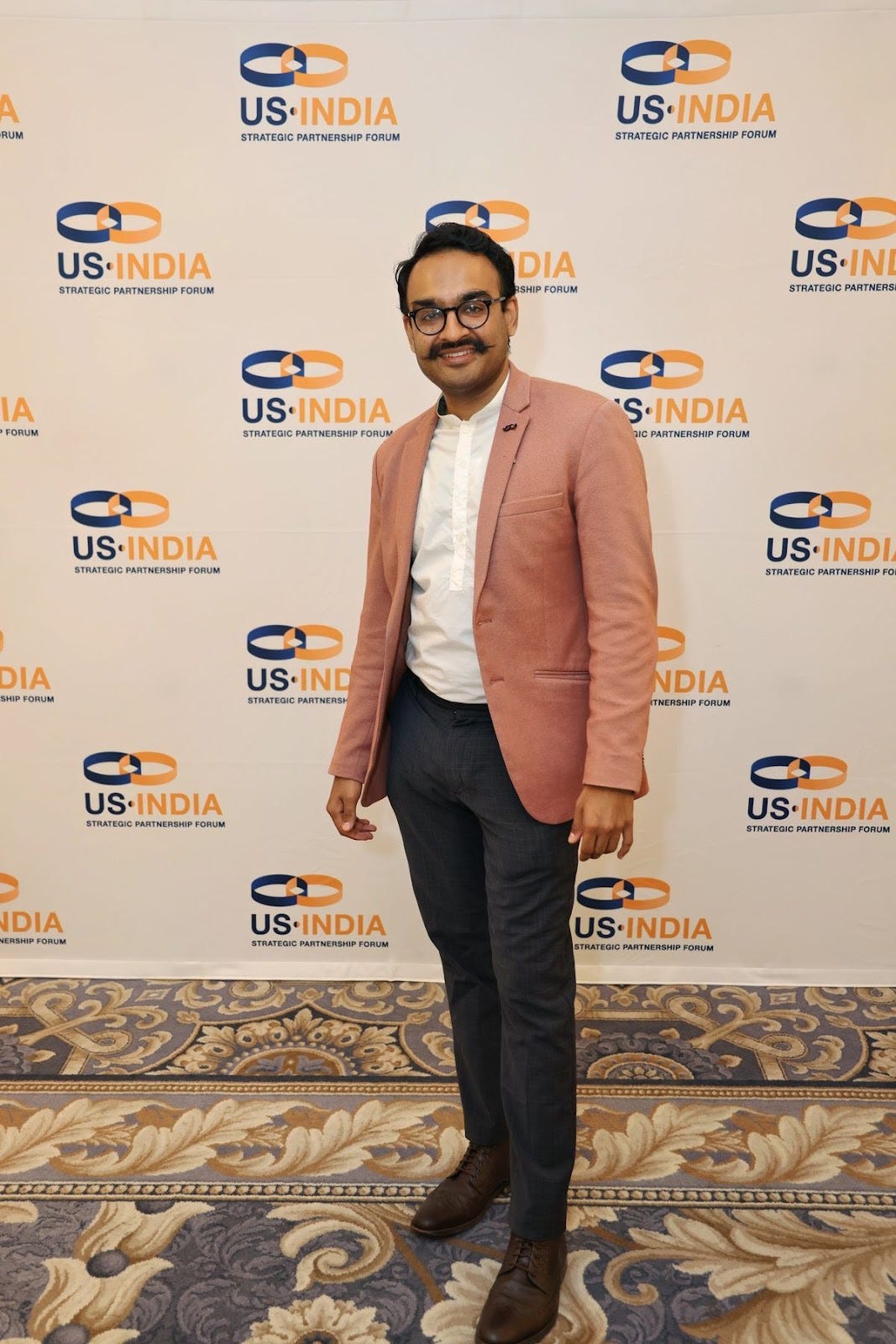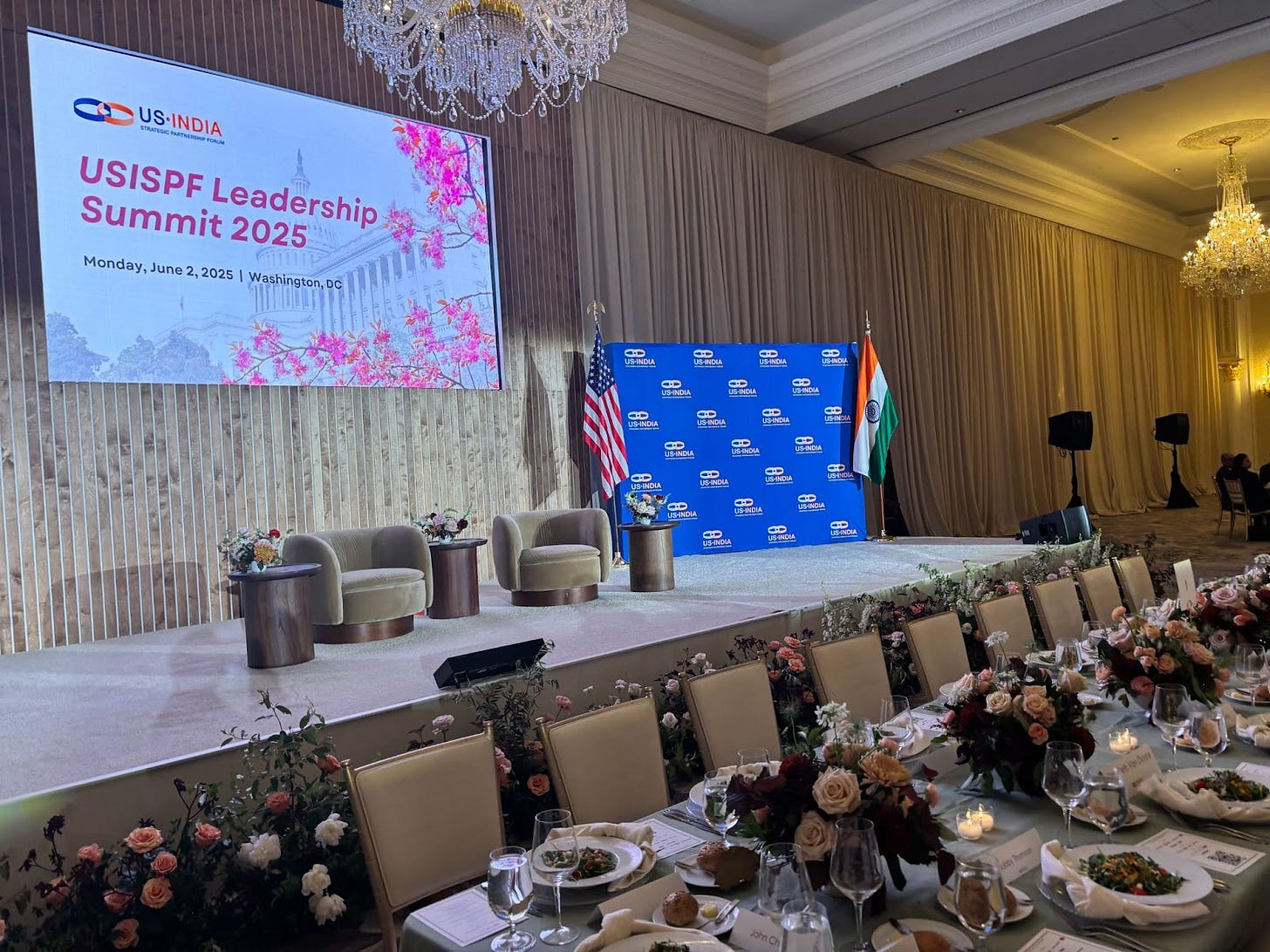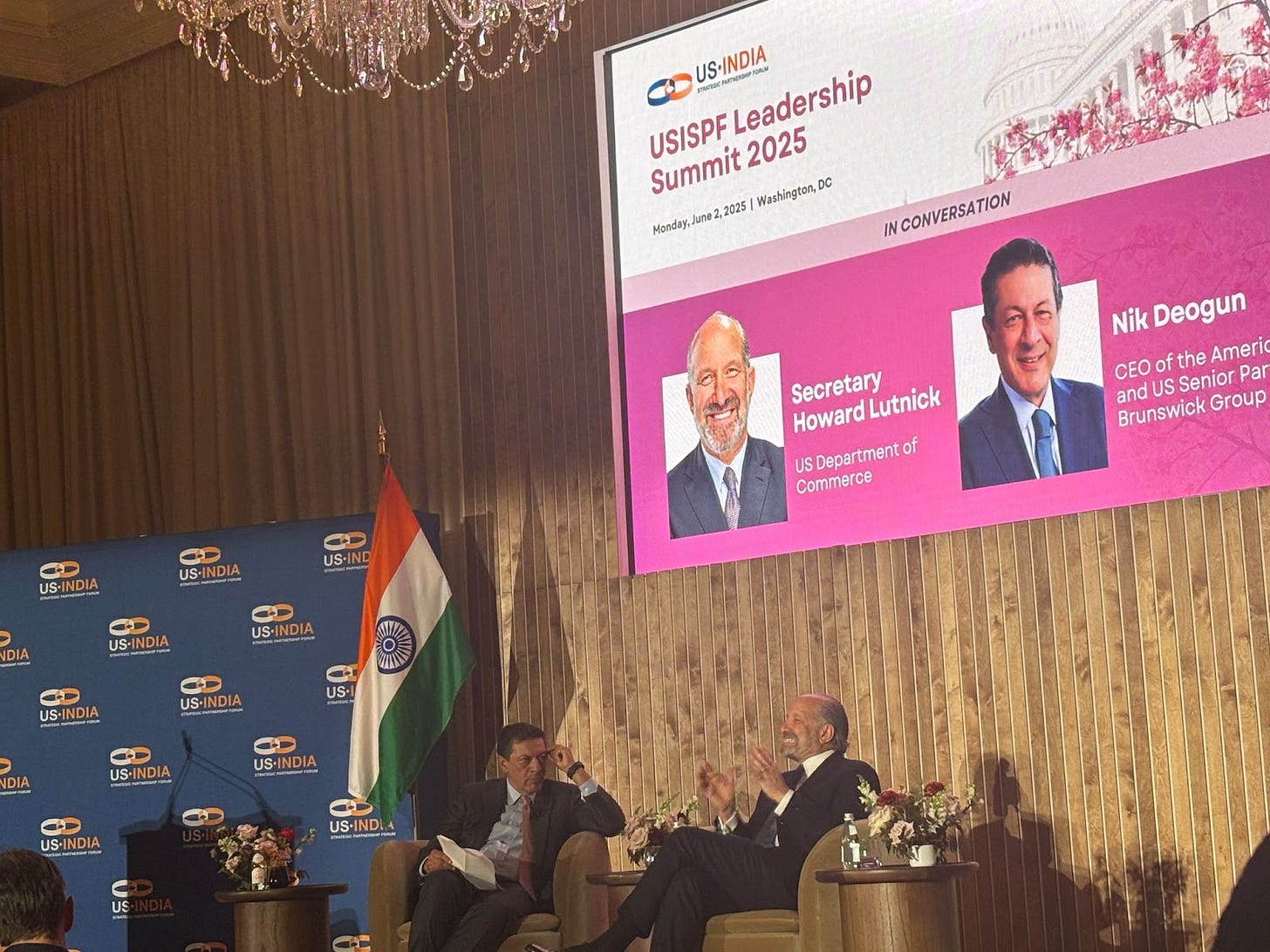IBM CEO Arvind Krishna: “100% Certainty” Total Number of Jobs will Increase Because of A.I. Meanwhile A.I.agents proliferate and Anthropic CEO says 50% of all entry level white collar jobs are at risk
Key A.I. and tech related news and insights from attending the US--India 2025 Leadership Summit in Washington DC. Feat. Sec. Lutnick, Sen. Daines and CEOs of IBM, Birla and Hitachi.
Programming note: I’m back in Washington, D.C., indefinitely, as I continue my fellowship reporting and researching at the nexus of technology and politics in Trump’s Washington. I’ll be focused on key areas of A.I. risk and innovation, online speech issues and relevant federal agencies like the FTC, FCC as well as U.S.-India relations and A.I. related bills on Capitol Hill. Reach out if you’d like to chat about story ideas or collaborate on an event around A.I., Art and Culture!
Everyone at the US-India 2025 Leadership Summit in Washington, D.C. was positively buzzing with a rosy outlook regarding India’s rise economically and America’s strategic shift away from China thanks to a likely upcoming U.S.–India trade deal (“very optimistic” said Commerce Sec. Lutnick) and the mutual trust and tech talent between the two countries. The ‘bilateral vibes’ were at an all time high but we'll have to wait and see if real deals and diplomacy-in-action back it up.
I listened to and spoke with top tech leaders from IBM in the U.S. and Birla in India as well as U.S. congressmen and senators relevant to the U.S.--India relationship at the USISPF 2025 Leadership Summit at the Waldorf Astoria in Washington DC.
—“Why is India important? There is a global strategic pivot going on that is increasingly moving away from China in terms of capital and investment and looking at where is the next big opportunity and it's India,” Republican Sen. Daines of Montana said at the Leadership Summit.
—“We want our allies to participate in the A.I. revolution with us and if India is interested which of course it is and it wants to build giant data centres and be a part of that A.I. model we are ready, willing and look forward to embracing India when it comes to A.I. as a partner and friend in that path,” Commerce Secretary Howard Lutnick said.
A.I. and Jobs
–IBM CEO Arvind Krishna predicted with “100% certainty” the total number of jobs because of A.I. will increase. Krishna said taking the big macro perspective, more productive companies and nations always gain market share and if they gain then they will need more people to serve the demands of being more productive.
–Jensen Huang, the CEO of chipmaking giant NVIDIA seemed to agree with Krishna while speaking at VivaTech in Paris this week. “Everybody’s jobs will be changed. Some jobs will be obsolete, but many jobs are going to be created … Whenever companies are more productive, they hire more people,” Huang said.
–Krishna said A.I. will also help with jobs because it can help augment humans due to severe population decline across the world – especially in Japan, Korea and China, but also Europe and the U.S. minus immigration – and so if you don't have technology like A.I. that can augment humans “we'll have another serious problem” on our hands to maintain and improve GDP and our standard of life he said.
–"To get a bit more real, some job displacement is likely and possible,” Krishna said but highlighted the job losses would be 8 or 10% max of current jobs. Furthermore Krishna said through reskilling upskilling “its incredibly easy to take care of this issue.”
He said 60-70% of jobs won't be affected by A.I. at all because of “human interaction, front line jobs and how machines will be a lot more expensive than it appears right now. None of those jobs will get touched.”
–Krishna, the IBM CEO said “the reason for all the A.I. angst is that this is the first time the lower end of white collar work is being attacked by technology while blue collar jobs have been attacked by machines for well over 100 years.”
–Krishna said 6-8K jobs have already been taken out by automation and A.I. in America but total employment has increased. “It’s on us to upskill and reskill our people to ensure our people are the ones that get the new jobs within the A.I. revolution.”
Meanwhile, Dario Amodei — CEO of Anthropic, one of the world's most foremost creators of artificial intelligence told Axios last week that A.I. could wipe out half of all entry-level white-collar jobs — and spike unemployment to 10-20% in the next one to five years.
Amodei said AI companies and governments need to stop "sugar-coating" what's coming. "Most of them are unaware that this is about to happen.” "It sounds crazy, and people just don't believe it," he told Axios.
The latest Anthropic research, Axios reported, shows that A.I. models are currently being used mainly for augmentation — mostly helping or assisting people do a job on the sidelines. This can, in theory, help create an ideal atmosphere by adding value and efficiency for workers and employers by allowing more time for workers to focus on high-level strategic tasks while the A.I. does the more routine, lower level tasks.
However, in reality, Amodei said that in the near future A.I. use in companies will move rapidly toward high level automation — as in A.I. actually doing the full job altogether.
"It's going to happen in a small amount of time — as little as a couple of years or less," Amodei said.
Commerce Sec. Lutnick and Senator Steve Daines on India’s rise and America’s strategic shift from China
—Daines said “Indian students now exceed Chinese students coming to U.S. universities and so if you think about Wayne Gretzky's famous line, ‘skate to where the puck is headed’ that's India, so yes I’m bullish about its longterm prospects.”
–“Let’s keep an eye on where the innovation ecosystem is headed and where we have the talent and the trust… and to me, that is India,” Daines said. The senator highlighted that “I wouldn’t dare to bring my phone to China,” pointing out serious national security concerns and lack of trust where as he felt perfectly safe using his personal or work phone to call, text and video chat family and friends when he’s in India.
–Commerce Secretary Howard Lutnick is "very optimistic" about a trade deal between the US and India, suggesting an agreement could come before a July deadline for higher tariffs.
–A team of U.S. officials will visit New Delhi in early June to advance talks on a three-tranche trade pact, which may include market access for industrial goods, farm products, and non-tariff barriers.
–Lutnick said both nations are discussing reducing tariffs to a "reasonable and appropriate" level, and that India may get more favorable terms by being one of the first countries to agree to a deal.”
–Lutnick also discouraged India from being part of BRICS and any entity that doesn’t support “the U.S. dollar hegemony.”
–Lutnick pushed for India to stop buying military arms from Russia and instead purchase them from the U.S.
Immigration and Investment
–Lutnick expects the ‘Trump card’ to increase Indian immigration to America and increase Indian participation in the U.S. economy while not paying global taxes, only paying U.S. taxes on U.S. assets not global assets. This would happen through an international entrepreneur special category visa for the “great people of India that want to participate and have means to participate,” in the U.S. economy, Lutnick said.
–Birla is the biggest Indian investor in America through its investment in Nuvalis for aluminum can productions and its investment in Columbian Chemicals Company headquartered in Georgia state to create Carbon Black used in tyres and other similar products. The U.S. is a very attractive destination to invest in and potentially migrate to for Indians, as per Birla CEO Kumar Mangalam Birla.
Second Lady Usha Vance
–Usha Vance used the USISPF Leadership summit to announce and tout her new ‘Summer Reading Challenge’ – to read 12 books between June and September and track one's progress.
The initiative is rooted in the belief that while children (as well as adults) face a myriad of constant distractions in the digital age, they also have the innate human capacity to focus and go deep into one subject which can lead to the creation of something meaningful.
Vance, a mother of three, described how she has seen data indicating how children are not reading “as much as they used to,” and is using this challenge as her “first attempt” to help remedy this loss.
Here are some photos from the summit:
#USISPFSummit2025 #LeadershipSummit #USIndiaPartnership #GlobalBridges #Community #Innovation #Leadership #DiasporaPower #AI #Diplomacy #Jobs #TechTransfer #ArtificialIntelligence








